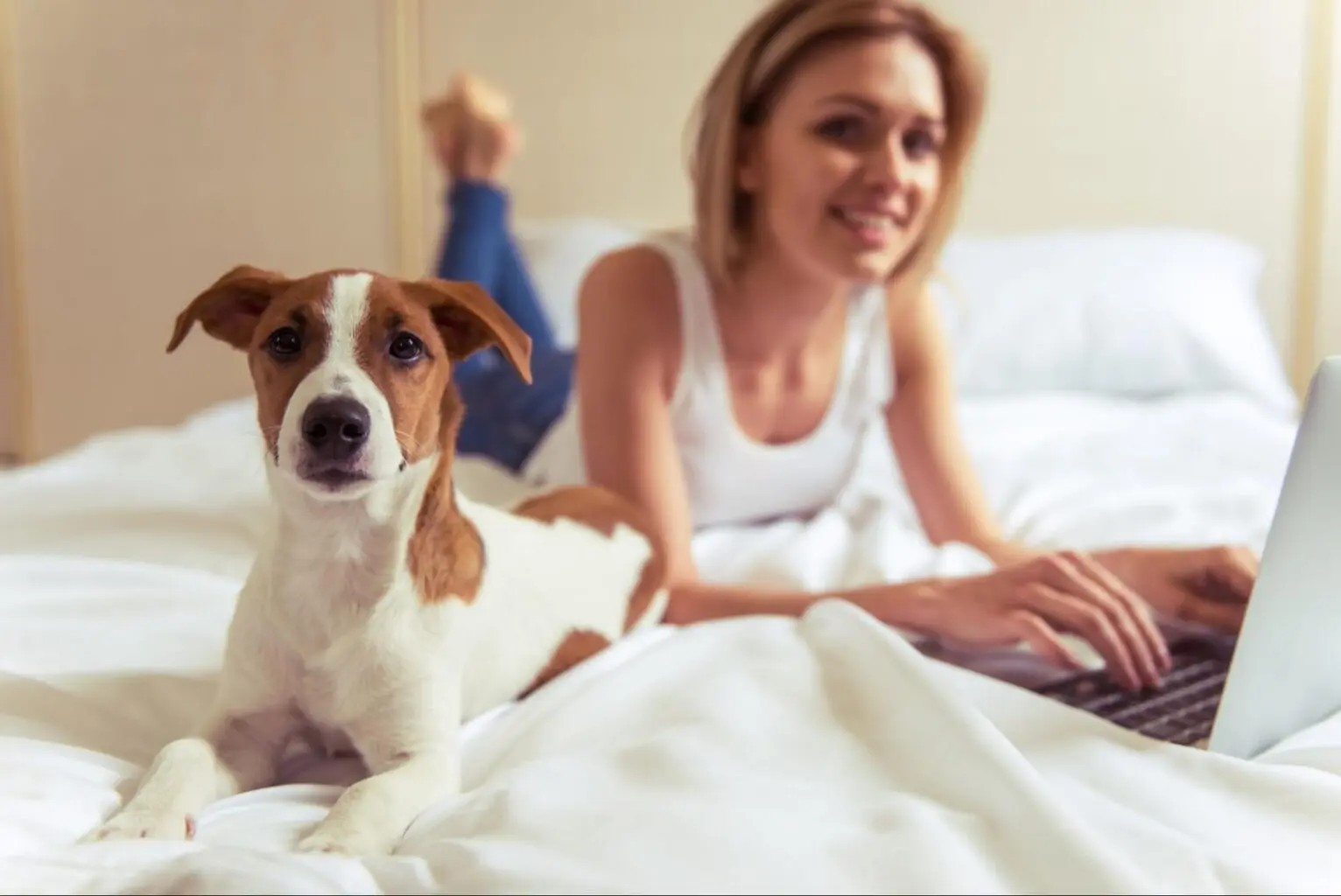As any pet owner will tell you, their pet is part of the family. And given that up to 66% of households in the United States own a pet, with dogs being the most popular (65.1 million households) followed closely by cats (46.5 million households), it’s not surprising that the demand for pet friendly hotels is steadily increasing.
A recent survey of 10,000 American dog owners found that 82% of them sometimes travel with their dog by car and 33% by plane. In the same survey, when asked what the most inconvenient thing about owning a dog and wanting to travel was, the top answers were finding a sitter and being unable to bring their dog with them.
The hospitality industry is already responding to the increased demand for accommodations for our furry friends. Hotels worldwide that already offer luxury experiences, such as the Rosewood in Hong Kong, are on board with allowing guests to bring their pets, especially for more extended stays. And it’s not just about leaving your dog in the hotel room while you go out and explore the sights; the hotel offers amenities for your pet such as pet washing and grooming, dog training, a daycare, and even recommendations for dog-friendly restaurants, bars, and parks so you can truly enjoy your vacation with your furry best friend.
But pet-centric vacation experiences don’t have to be isolated to luxury hotels. With a bit of creativity and planning, you can offer your guests the option to bring their pets and boost your revenue simultaneously with little investment.
In this article, we explore the ins and outs of pet-friendly hotels in the United States, including benefits, challenges (and solutions for those challenges), upselling tips, and more.
How Do Pet-Friendly Hotels Differ From Typical Hotels?
Of course, hotels that are pet friendly differ from regular hotels because they offer more amenities for pets, but let’s go deeper into the hotel management differences by breaking them down further:
| Category | How a Pet Friendly Hotel Differs From a Non-Pet-Friendly Hotel |
| Amenities and Services | Pet-specific amenities: Pet-friendly hotels across the USA offer a range of amenities designed for pets, including pet beds, food and water bowls, pet toys, and treats. Some hotels also provide special pet menus. Pet services: Sometimes hotels that are pet friendly provide additional services such as pet-sitting, dog-walking, grooming, and even pet spas. These services ensure that pets are well taken care of during the guests’ stay. |
| Room Features and Layout | Pet-friendly rooms: Rooms designated for pet owners typically have pet-friendly flooring (such as tile or laminate instead of carpet) and furnishings that are easier to clean and maintain. Outdoor access: Many pet-friendly hotels across the USA offer rooms with direct access to outdoor areas, making it convenient for pet owners to take their pets outside without navigating through the entire hotel. |
| Policies and Procedures | Pet policies: Pet-friendly hotels have specific policies in place regarding pets. These can include breed and size restrictions, a limit on the number of pets per room, and guidelines for pet behavior. Pet fees: These hotels often charge additional fees for pets, which can include nightly pet fees or a one-time cleaning fee to cover the cost of extra cleaning and maintenance. |
| Outdoor Areas and Facilities | Pet-friendly spaces: Many pet-friendly hotels provide designated outdoor areas where pets can play and exercise. These spaces might include dog parks, walking trails, or fenced-in areas for off-leash play. Waste stations: To maintain cleanliness, pet-friendly hotels often provide waste stations equipped with bags and disposal bins. |
| Staff Training and Support | Trained staff: Staff at pet-friendly hotels are typically trained to handle pets and address the needs of pet owners. This training ensures that staff can provide a welcoming and accommodating environment for all guests. Emergency protocols: These hotels often have protocols in place for handling pet-related emergencies, including contact information for local veterinarians and pet hospitals. |
| Marketing and Branding | Targeted marketing: Pet-friendly hotels in the US often emphasize their pet accommodations in marketing campaigns to attract pet owners. This includes showcasing pet amenities and services on their website and in promotional materials. Community engagement: These hotels may engage in pet-related community events and partnerships, such as hosting adoption events or sponsoring local pet organizations, to enhance their brand image and connect with the pet owner community. |
| Guest Experience and Satisfaction | Enhanced guest experience: By catering to pet owners, pet-friendly hotels ensure a more inclusive and enjoyable experience for guests traveling with pets. This focus on the entire family, including pets, often leads to higher guest satisfaction and loyalty. Special packages: Pet-friendly hotels may offer special packages that include pet amenities and services, providing added value and convenience for pet owners. |
So you manage a hotel? We make it easy
Newbook is your all in one hotel management software. Talk to us today to learn how you can improve operations and increase bookings for your hotel.


Benefits of Hotels That Are Pet Friendly

By offering pet-friendly accommodations, hotels can tap into new customer segments, leverage higher rates and upsell opportunities, and enhance overall guest satisfaction and loyalty. This strategy not only boosts revenue but also creates a distinctive competitive edge, fosters community engagement, and enhances the hotel’s brand image.
1. Unlocking New Customer Segments
- Appealing to pet owners: By being pet-friendly, hotels can attract a significant market of pet owners who prefer or require accommodations that allow their furry companions. This segment includes travelers who might otherwise avoid hotels that do not accommodate pets.
- Expanding market reach: Families, solo travelers, and business professionals who travel with pets will consider pet-friendly hotels over others, widening the customer base and increasing occupancy rates.
2. Higher Rates and Upsell Opportunities
- Premium pricing: Pet-friendly rooms can often command higher rates due to the added amenities and services provided for pets. This premium pricing can boost overall revenue.
- Upsell opportunities: Hotels can offer additional services such as pet grooming, pet-sitting, special pet menus, and pet-friendly room upgrades, creating multiple upsell opportunities that enhance the guest experience and increase spending per stay.
3. Enhanced Guest Loyalty and Satisfaction
- Building loyalty: Pet owners appreciate and remember hotels that cater to their entire family, including their pets. This positive experience fosters loyalty, encouraging repeat visits and positive word-of-mouth recommendations.
- Increased guest satisfaction: By providing pet amenities like pet beds, bowls, and treats, hotels can enhance the stay experience for guests, leading to higher satisfaction scores and positive reviews.
4. Competitive Advantage
- Differentiation: Being pet-friendly can set a hotel apart from competitors who do not offer such accommodations. This unique selling point can be a deciding factor for travelers choosing between similar hotels.
- Marketing edge: Pet-friendly policies can be highlighted in marketing campaigns, appealing to a niche market and drawing in guests who prioritize pet accommodation in their travel plans.
5. Community Engagement and Brand Image
- Community events: Hosting pet-related events, such as adoption drives or pet-friendly social gatherings, can boost the hotel’s profile within the local community and attract more visitors.
- Positive brand image: Supporting pet-friendly initiatives and showcasing a compassionate, inclusive brand image can resonate well with a broad audience, enhancing the hotel’s reputation.
6. Increased Booking Flexibility
- Extended stays: Pet owners are more likely to extend their stays at a hotel that accommodates their pets, leading to increased revenue from longer bookings.
- Seasonal demand: Pet-friendly hotels can attract guests during various travel seasons, including holidays and vacation periods when families are more likely to travel with pets.
7. Revenue from Pet Fees
- Additional revenue streams: Hotels can create an additional revenue stream by charging pet fees (either per stay or per night). These fees can help cover the extra costs associated with cleaning and maintenance for pet-friendly rooms.
- Justifying premium services: Pet fees can be used to justify the premium services and amenities offered to pet owners, ensuring they feel they are getting value for their money.
8. Improved Occupancy Rates
- Attracting longer stays: Pet owners are more likely to choose hotels that accommodate their pets, which can lead to higher occupancy rates, especially during peak travel seasons.
- Reduced vacancy: By opening up to pet owners, hotels can fill rooms that might otherwise remain vacant, particularly during off-peak times.
9. Strengthening Customer Relationships
- Personalized service: Providing amenities and services tailored to pets can make guests feel valued and understood, strengthening their connection to the hotel.
- Memorable experiences: Offering unique pet-friendly experiences can create lasting memories for guests, increasing the likelihood of return visits and recommendations.
10. Environmental and Health Benefits
- Promoting outdoor activities: Pet-friendly hotels often provide easy access to outdoor spaces, encouraging guests to spend more time outside with their pets, which promotes physical activity and well-being.
- Cleaner environment: Providing designated pet relief areas and waste disposal stations helps maintain cleanliness and hygiene, benefiting all guests.
Challenges for Hotels that are Pet Friendly (& How to Solve Them)

Embracing a pet-friendly policy can be a significant draw for hotels, attracting a loyal customer base of pet owners. However, accommodating pets also presents unique challenges that require thoughtful solutions to ensure a positive experience for all guests. From adhering to regulations and managing potential damage to addressing allergies and ensuring guest satisfaction, pet-friendly hotels must navigate a variety of issues.
1. Regulations to be Aware of
Challenge: Hotels must comply with local, state, and federal regulations concerning pets. This can include health and safety regulations, zoning laws, and specific requirements for accommodating service animals.
Solution:
- Stay informed: Keep up-to-date with all relevant regulations by regularly reviewing government websites and industry publications.
- Consult legal experts: Work with legal advisors to ensure your policies comply with all regulations.
- Train staff: Provide thorough training for staff on regulations and how to handle compliance issues.
2. Potential Damage and Increased Cleaning
Challenge: Pets can damage hotel property by chewing furniture, scratching floors, or causing accidents on carpets, leading to higher maintenance and cleaning costs.
Solution:
- Pet deposits and fees: Charge a refundable pet deposit or a non-refundable pet fee to cover potential damages and additional cleaning costs.
- Designated pet areas: Allocate specific rooms or floors for guests with pets to contain potential damage and make cleaning more manageable. For example, some hotels may allocate rooms on the ground floor for guests with dogs to make outdoor potty breaks easier.
- Durable materials: Use pet-friendly materials in designated rooms, such as scratch-resistant flooring and easily washable fabrics.
3. Allergies
Challenge: Guests with allergies to pet dander may experience discomfort or health issues, which can negatively impact their stay.
Solution:
- Allergen-free rooms: Maintain a number of pet-free rooms or floors to accommodate guests with allergies.
- Deep cleaning protocols: Implement rigorous cleaning procedures in pet-friendly rooms to minimize allergens, including using HEPA filters and hypoallergenic cleaning products.
- Clear communication: Clearly communicate pet policies and available allergen-free options on your website and at the time of booking.
4. Noise and Disturbance
Challenge: Pets, particularly dogs, can create noise and disturbances, which might bother other guests.
Solution:
- Noise mitigation: Provide pet owners guidelines to minimize noise, such as not leaving pets unattended in rooms.
- Quiet zones: Designate certain areas or floors as quiet zones where pets are not allowed.
- Pet-sitting services: Offer pet-sitting or dog-walking services to keep pets occupied and reduce noise when owners are away.
5. Handling Pet Waste
Challenge: Managing pet waste effectively is crucial to maintaining hygiene and guest satisfaction.
Solution:
- Pet waste stations: Install pet waste stations equipped with bags and disposal bins in outdoor areas.
- Guest guidelines: Provide clear guidelines to pet owners about cleaning up after their pets and where designated pet relief areas are located.
- Frequent checks: Ensure staff regularly check and maintain pet waste stations to keep the area clean.
6. Potential Liability
Challenge: Pets can occasionally become aggressive or cause accidents, leading to potential liability issues for the hotel.
Solution:
- Liability waivers: Require pet owners to sign liability waivers upon check-in, acknowledging responsibility for their pets’ behavior.
- Insurance coverage: Ensure the hotel’s insurance policy covers incidents involving pets.
- Behavior policies: Implement and enforce strict behavior policies, including breed restrictions if necessary, to mitigate risks.
How to Upsell Pet Friendly Hotels: 10 Tips for Maximizing Revenue

Pet-friendly hotels offer unique opportunities to enhance guest experiences and boost revenue through strategic upselling. Here are some effective tips to maximize revenue in a pet-friendly hotel:
1. Offer Pet Packages
Create special pet packages during the reservation process that include various amenities and services for pets. These packages can include items such as pet beds, bowls, treats, toys, and even spa services. Bundle these amenities into a premium package that guests can add to their booking.
2. Highlight Pet-Friendly Services
Promote additional services tailored for pets, such as grooming, pet-sitting, and dog-walking. Ensure these services are visible during the booking process and in marketing materials. Offer these services as add-ons that guests can easily include with their stay.
3. Host Pet Events
Organize pet-friendly events and activities. Events like pet meet-and-greets, agility courses, or pet photo shoots can attract pet owners. Charge a participation fee or offer these as part of a premium package to generate extra revenue.
4. Provide In-Room Pet Amenities
Upsell in-room amenities designed specifically for pets. Offer items like gourmet pet meals, pet beds, and special pet toiletries. These can be presented as luxury upgrades for guests who want to pamper their pets.
5. Develop a Loyalty Program for Pets
Create a loyalty program that rewards repeat pet owners. Offer discounts, exclusive amenities, and special services to guests who frequently bring their pets. This not only encourages repeat business but also upsells through exclusive offerings.
6. Partner with Local Pet Services
Collaborate with local pet businesses to offer exclusive services. Form partnerships with local groomers, trainers, or pet boutiques. Offer these services through your hotel, either as part of a package or as standalone upsell options.
7. Market Pet-Friendly Room Upgrades
Promote rooms with extra space or special features ideal for guests with pets. Highlight rooms with direct outdoor access, are larger, or have pet-friendly furnishings. Charge a premium for these upgraded accommodations.
8. Utilize Personalized Marketing
Send personalized offers to guests who have previously stayed with pets. Use your Property Management System (PMS) to track guest preferences and send tailored promotions for pet-friendly amenities and services. Personalized offers are more likely to convert and increase spending.
9. Enhance the Booking Experience
Make it easy for guests to select pet-friendly options during the booking process. Clearly display pet-friendly options and add-ons on your website and booking engine. Use visuals and detailed descriptions to entice guests to upgrade their booking with pet-friendly services.
10. Provide Welcome Kits for Pets
Offer welcome kits for pets upon arrival. These kits can include treats, toys, waste bags, and information on local pet services and attractions. Market these welcome kits as a special add-on that enhances the stay experience for pets and their owners.
So you manage a hotel? We make it easy
Newbook is your all in one hotel management software. Talk to us today to learn how you can improve operations and increase bookings for your hotel.


Upselling Hotel Software: How Newbook Checks All the Boxes
These days, most people book accommodations online. That means that you need to incorporate a booking system into your website and allow it to act as a salesperson (of sorts).
Newbook’s online room booking system is functional and works perfectly with our complete PMS and Revenue Management System. This setup gives you awesome insights from booking data, helping you make smarter decisions. Imagine using detailed info about your customers to improve your marketing efforts. By looking at data on favorite room types and popular extras booked, you can fine-tune your marketing campaigns to be more effective.
You can also use this data to present your customers with extra amenities during the booking process that make sense, allowing the process to feel less like upselling and more like genuine recommendations to enhance their stay and experience. For example, you can incorporate typical couple amenities into the booking process, like adding a bottle of wine and a charcuterie board to come to the room upon arrival. Or, you can offer room upgrades to give the guests the opportunity to gift themselves a more luxurious experience.
And with Newbook, you can be sure that you’re investing in reliable software. Newbook’s software is super reliable and fast, making it stand out from the competition. While many booking providers promise 99% uptime, Newbook goes above and beyond with an impressive 99.99% uptime rate.
Here’s a comparison to show what this means:
| Reliability Rating | Potential Outage Time |
|---|---|
| 99% | -3 days, 15 hours, and 39 minutes annually |
| 99.99% | -52 minutes and 35 seconds annually |
That small difference of 0.99% actually makes a big impact on reliability. With Newbook, you get less than an hour of potential downtime each year, ensuring your business runs smoothly and efficiently. This makes Newbook the top choice for anyone looking for a dependable room booking solution.
Your all-in-one, online booking system
Newbook is your all in one online booking system. Talk to us today to learn how you can improve operations and increase booking for your business.


Conclusion
The demand for pet-friendly hotels is rapidly growing. Catering to this trend enhances guest satisfaction and opens up new revenue streams and competitive advantages for hotels. By embracing pet-friendly policies, hotels can attract a broader customer base, increase occupancy rates, and boost revenue through strategic upselling. From offering specialized amenities and services to addressing potential challenges with thoughtful solutions, pet-friendly hotels can ensure a positive guest experience. Ultimately, this approach fosters loyalty, enhances brand image, and positions hotels as welcoming and inclusive destinations for travelers and their furry companions.
With Newbook, you can streamline your booking process, handle upsell initiatives, organize your customer data, and much more through one comprehensive property management system. Discover how Newbook can help you streamline operations and boost revenue by getting in touch with us today.

